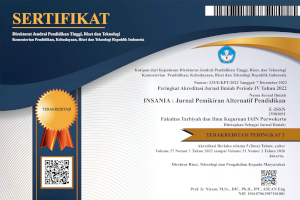KONSEP PENDIDIKAN IKHWAN AL-SHAFA DAN RELEVANSINYA DENGAN DUNIA POSTMODERN
DOI:
https://doi.org/10.24090/insania.v24i1.2802Keywords:
Concept, Education, Ikhwanas-Shafa, Relevance, PostmodernAbstract
Abstract: The Ikhwan al-Shafa is an organization established by a group of people (mujtahidin) consisting of philosophers, who focused their attention on the field of da'wah and education, that developed at the end of the second century Hijrah in the city of Basra, Iraq. It is a discussion and teaching forum. In general, its emergence is motivated by concerns about the implementation of Islamic teachings that have been contaminated by teachings from outside Islam at that time, and to revive love for science among Muslims. They compiled 51 agreements known as the "Rasail Ikhwan al-Shafa" (Ikhwan al-Shafa agreement). The background of Rasail Ikhwan al-Shafa writing came from dissatisfaction with the implementation of the Islamic education and lifestyle at that time. This organization viewed education with a rational and empirical view, or a combination of intellectual and factual views. They viewed science as a description of something that could be known in nature, the knowledge produced by human thought occurs because it receives information materials sent by the five senses. Some of the Ikhwan al-Shafa's concepts or thoughts about education have an urgent relevance to education that is applied in the current postmodern era. Whether it's how to get knowledge, teacher competency standards, goals, curriculum and methods that are used. Keywords: Concept, Education, Ikhwanas-Shafa, Relevance, Postmodern.Downloads
References
Abu Tauhid. 1990. Beberapa Aspek Pendidikan Islam, Yogyakarta: Sekretariat Ketua Jurusan Fak. Tarbiyah IAIN Sunan Kalijaga.
Cyril Glasse. 1999. Terj. Ghufron A. Mas'adi, Ensiklopesia Islam. Jakarta : PT Raja Grafindo Persada.
Daryanto. 2013. Standar Kompetensi Dan Penilaian Kinerja, Guru Profesional Yogyakarta: Gava Media.
Departemen Agama RI. 2004. Al-Qur’an dan Terjemahnya. Semarang: CV. Al Waah.
Departemen Agama RI. 2006. Undang-undang dan Peraturan Pemerintah tentang Pendidikan, Jakarta: Direktorat Jenderal Pendidikan Islam.
E. Mulyasa. 2013. Standar Kompetensi dan Sertifikasi Guru, Bandung: PT Remaja Rosdakarya.
Fachruddin Saudagar & Ali Idrus. 2011. Pengembangan. Profesionalitas Guru, Jakarta : GP Press.
Furqon Syarief Hidayatulloh. 2013. “Relevansi Pemikiran Ikhwan al-Shafa Bagi Pengembangan Dunia Pendidikanâ€, dalam TA’DIB, Vol. XVIII, No. 01, Edisi Juni 2013.
https://jahidinjayawinata61.wordpress.com/standar-kompetensi-guru-standar-kompetensi- kepala-sekolah-standar-kompetensi-pengawas-permendiknas-no-12-13-dan-16/
Jamal Ma'mur Asmani. 2009. 7 Kompetensi Guru Menyenangkan dan Profesional. Yogyakarta : Power Books (IHDINA).
Maragustam.2015. Filsafat Pendidikan Islam. Yogyakarta: Kurnia Kalam Semesta.
Muhammad Muntahibun. 2011. Ilmu Pendidikan Islam. Yogyakarta : Teras.
Omar Mohammad al-Toumy al-Syaibany. 1979. Falsafah Pendidikan Islam. Jakarta: Bulan Bintang.
Ramayulis dan Samsul Nizar. 2005. Ensiklopedi Tokoh Pendidikan Islam, Ciputat: Quantum Teaching.
Samsul Nizar. 2002. Filsafat Pendidikan Islam, Pendekatan Historis, Teoritis dan Praktis. Jakarta: Ciputat Pers.
Downloads
Published
How to Cite
Issue
Section
License
Authors who publish with this journal agree to the following terms:
Authors retain copyright and grant the journal right of first publication with the work simultaneously licensed under a Creative CommonsAttribution-ShareAlike License that allows others to share the work with an acknowledgment of the work's authorship and initial publication in this journal.
Authors are able to enter into separate, additional contractual arrangements for the non-exclusive distribution of the journal's published version of the work (e.g., post it to an institutional repository or publish it in a book), with an acknowledgment of its initial publication in this journal.
Authors are permitted and encouraged to post their work online (e.g., in institutional repositories or on their website) prior to and during the submission process, as it can lead to productive exchanges, as well as earlier and greater citation of published work (See The Effect of Open Access).








